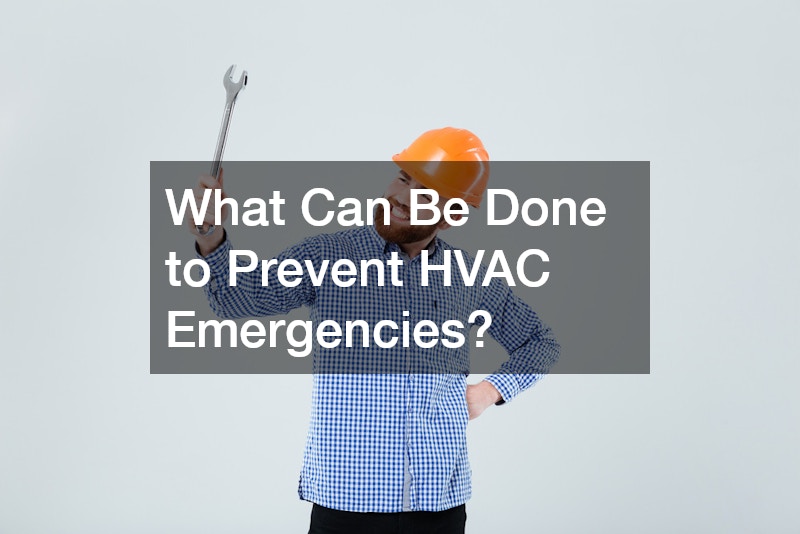Emergency HVAC services are crucial in maintaining comfort and safety in residential and commercial environments. Understanding their importance can help individuals and businesses make informed decisions when emergencies arise.
What are Emergency HVAC Services?
Definition and Scope
Emergency HVAC services refer to immediate repairs and maintenance performed on Heating, Ventilation, and Air Conditioning systems to restore functionality and comfort. These services are designed to address urgent issues that can significantly impact the indoor environment.
The scope of emergency HVAC services includes repairing breakdowns, fixing ventilation issues, and addressing inefficient heating or cooling. They are an essential part of property management, ensuring that any disruptions are resolved promptly.
Response time is a critical factor in these services, as delays can exacerbate problems. Skilled professionals are equipped to assess issues quickly and provide effective solutions.
Common Situations Requiring Emergency Services
Breakdowns during extreme weather are a primary reason for requiring emergency HVAC services, as they can pose serious risks to health and safety. Whether it’s icy outdoor temperatures or a scorching heatwave, a functional HVAC system is essential.
Unusual noises emanating from HVAC units can indicate an underlying problem that needs immediate attention. Ignoring these noises could lead to a total breakdown or further component damage, raising repair costs.
Complete HVAC failure is a dire situation that requires quick professional intervention to restore normalcy. Such failures can lead to comfort and safety issues, especially in densely populated or critical environments such as hospitals.
Why are Emergency HVAC Services Essential?
Ensuring Safety and Comfort
Functioning HVAC systems play a crucial role in maintaining safe indoor temperatures, particularly vital for the health of vulnerable populations. For instance, infants, elderly individuals, and those with medical conditions rely on consistent indoor conditions to avoid health complications.
Besides temperature control, HVAC systems impact indoor air quality, which is essential for overall well-being. A reliable system mitigates the risk of harmful airborne particles, ensuring a comfortable and healthy indoor environment.
Immediate attention to HVAC issues helps avoid discomfort and potential health hazards. Emergency services ensure systems are operational and efficiently mitigate risks associated with prolonged exposure to extreme temperatures.
Preventing Long-Term Damage
Immediate repairs can prevent extensive damage to HVAC systems, which could otherwise lead to more costly fixes or replacements in the future. Addressing issues as they arise can avert emergencies, preserving both equipment lifespan and financial resources.
Procrastination in addressing HVAC problems can result in more severe damage, compounding repair costs. Swift interventions help avoid the escalation of minor issues, offering peace of mind and financial savings.
Insurance premiums and utility bills can also be impacted by neglected HVAC systems. Regular and emergency maintenance ensure systems operate efficiently, minimizing unnecessary expenses.
How to Choose a Reliable Emergency HVAC Service Provider?
Key Factors to Consider
When choosing an emergency HVAC service provider, it is crucial to consider their availability to ensure they can respond promptly to emergencies. A provider’s response time can significantly impact the speed at which comfort and safety are restored.
Expertise in handling emergencies is another vital factor, as complex issues require skilled technicians who understand the intricacies of HVAC systems. Certifications and training highlight a provider’s ability to handle various types of emergencies efficiently.
Additionally, checking for licenses and insurance ensures the provider meets industry standards and offers protection against any incidents during repair. Reliable providers prioritize safety and quality service.
Evaluating Past Customer Experiences
Reviews and testimonials from previous customers can provide valuable insights into the reliability and quality of a service provider. Positive feedback often reflects a company’s dedication to customer satisfaction and service excellence.
Analyzing patterns in reviews, such as punctuality, professionalism, and the quality of repairs, gives potential customers a clearer picture of what to expect. Consistent complaints, however, may be a red flag, prompting a search for alternative providers.
In the digital age, online platforms and social media are vital in collecting honest customer feedback. Engaging with these resources assists individuals and businesses in making informed decisions about service providers.
What are the Costs Associated with Emergency HVAC Services?
Factors Influencing Costs
Costs can vary based on the complexity of the issue, time of service, and parts required for repair. Emergency services often carry a premium due to their immediate nature and the expertise required.
The urgency of service, necessitated by circumstances like extreme weather or time-dependent business operations, can also influence pricing. Understanding these cost factors helps manage expectations and budgeting needs.
Technicians’ skills and specializations can affect costs as well, as technically demanding repairs might incur higher fees. Knowledge of typical repair costs allows consumers to assess service quotes accurately.
Balancing Cost and Necessity
While emergency services may be more expensive, their necessity in preventing further damage and ensuring safety often justifies the cost. Timing and immediate intervention can be crucial, ultimately avoiding more significant financial burdens.
Investing in emergency services helps protect expensive HVAC equipment, preventing premature replacements. Long-term savings from maintaining system efficiency can outweigh the initial expenditure on emergency interventions.
Comparing the potential cost of extensive repairs or replacements against emergency service fees underscores the importance of prompt repairs. Prioritizing safety and functionality justifies the immediate expenses.
What Can Be Done to Prevent HVAC Emergencies?
Regular Maintenance Practices
Scheduled maintenance checks and routine servicing can significantly reduce the likelihood of unexpected breakdowns. Regular inspections ensure HVAC systems function optimally and help identify potential problems before they become emergencies.
Preventive measures include filter changes, system cleanings, and component inspections, maintaining high efficiency. These practices contribute to lower long-term costs and minimize the need for emergency interventions.
Importance of Early Detection
Identifying and addressing minor issues before they escalate can prevent emergencies. Small signs of wear or malfunction are red flags that, when caught early, can be resolved without disrupting service.
Responsive habits, like monitoring system performance and unusual behaviors, aid in early detection. A proactive approach encourages timely repairs and preserves system integrity.
.

